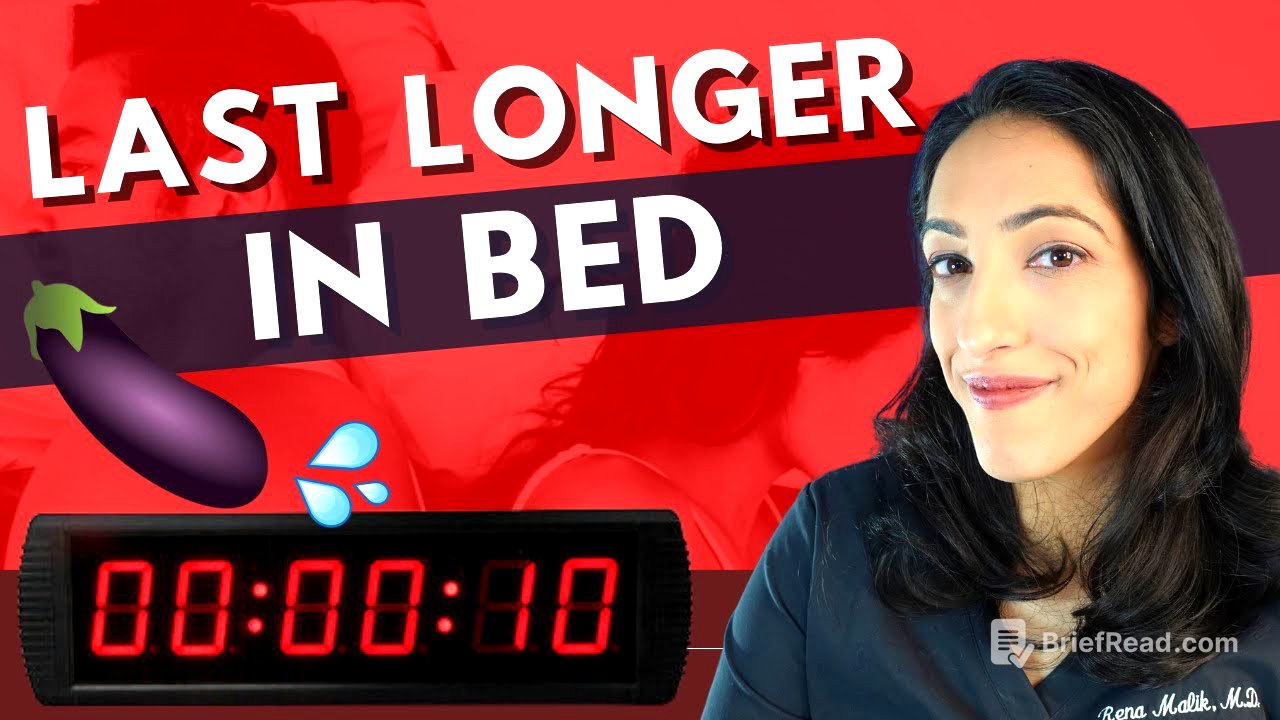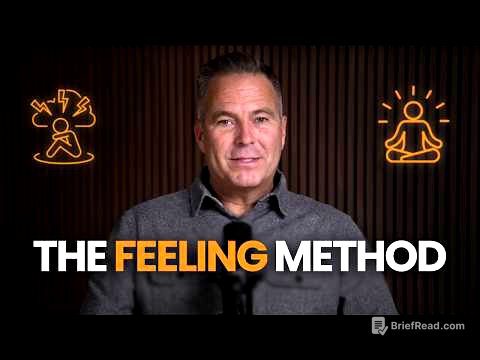TLDR;
This video by Dr. Rena Malik provides a comprehensive guide on how to last longer in bed, focusing on premature ejaculation (PE). It covers the definition, causes, and various treatment options available, including psychotherapy, the stop-start method, topical anesthetics like Promescent, and antidepressant medications. The video emphasizes the importance of communication with your partner and seeking professional help when needed.
- Premature ejaculation is defined by rapid ejaculation, inability to delay ejaculation, and negative personal consequences.
- Treatment options range from behavioral techniques and topical treatments to prescription medications.
- Communication with your partner and addressing psychological factors are crucial for managing PE.
Introduction: Understanding Premature Ejaculation [0:00]
Dr. Malik introduces the topic of lasting longer in bed by addressing premature ejaculation (PE). She references a previous video discussing the average duration of sex, which is about 5.7 minutes. She highlights that if both partners are satisfied with the duration, no intervention is necessary. However, if PE is a concern, it's important to define what constitutes PE and whether it's causing distress for either partner. Open communication with your partner about their desires and exploring various forms of stimulation beyond penetrative sex is also important.
Defining Premature Ejaculation [1:26]
Premature ejaculation is defined by three key components: ejaculation within one to two minutes of penetration, the inability to delay ejaculation in nearly all sexual encounters, and negative personal consequences such as stress or anxiety. Primary PE refers to a lifelong issue, while secondary or acquired PE develops after a period of normal ejaculatory function, typically marked by ejaculation occurring in less than three minutes. The underlying cause is often linked to abnormal serotonin transmission in the brain, affecting the receptors that inhibit ejaculation. Ejaculation is a reflex controlled by the spinal ejaculation center, which processes sensory input and brain signals.
Diagnosis and the Importance of Seeking Help [3:47]
Premature ejaculation is a stressful problem, and many men try multiple solutions before consulting a doctor. Diagnosis is clinical, based on a discussion of the patient's history and symptoms, rather than specific tests. If the symptoms align with the definition of PE and cause distress, treatment is warranted.
Psychotherapy and Behavioral Techniques [4:29]
Psychotherapy or sex therapy is a primary treatment option, addressing psychological factors like depression, stress, anxiety, and guilt that can impact ejaculation time. Combining psychotherapy with other treatments can significantly increase ejaculation time. The "stop-start" method involves the partner squeezing the penis when ejaculation is imminent, causing a partial loss of erection, repeated three times before allowing ejaculation. Pelvic floor physical therapy can also help identify and control muscles related to ejaculation.
Topical Anesthetics: Delay Sprays and Creams [5:43]
Topical anesthetics, such as delay sprays, are a first-line medical therapy. These numbing agents reduce sensitivity in the glans penis, diminishing sensory input to the spinal ejaculatory center. Promescent is highlighted as a clinically studied, over-the-counter delay spray with a metered-dose spray for consistent dosing. Clinical studies have shown that Promescent increases the average time to ejaculation and improves orgasm rates for both partners. Other options include prescription creams like EMLA (off-label) and Fortacin (approved in Europe), both containing numbing agents.
Antidepressant Medications: SSRIs and On-Demand Options [9:57]
Antidepressant medications, particularly selective serotonin reuptake inhibitors (SSRIs), are used off-label to delay ejaculation by increasing serotonin levels. Common SSRIs include fluoxetine, paroxetine, and sertraline, taken daily with a noticeable effect after several days or weeks. Side effects may include fatigue, nausea, and decreased libido. On-demand medications like clomipramine (taken 2-6 hours before sex) and dapoxetine (not available in the US) are also discussed, with similar side effects to SSRIs.
Other Treatments and Considerations [12:12]
The video addresses the importance of treating erectile dysfunction (ED) first, as ED medications like sildenafil or tadalafil can also improve PE. Other off-label therapies include tramadol (a pain medication with weak serotonin uptake inhibition) and alpha-blockers (typically used for enlarged prostate). Tramadol carries a risk of addiction and side effects like nausea and dizziness, while alpha-blockers can cause retrograde ejaculation.









